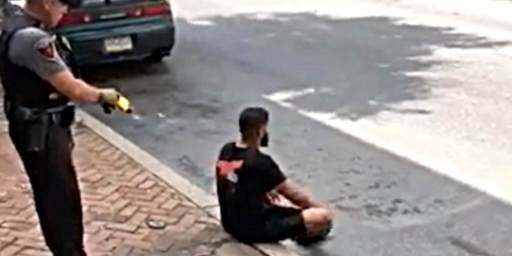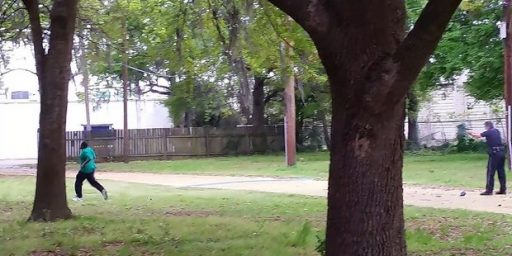Police Tasering Pregnant Woman ‘Justified’
 The 9th Circuit ruled yesterday that police can Taser pregnant women posing no risk so long as judges can concoct an implausible risk years later.
The 9th Circuit ruled yesterday that police can Taser pregnant women posing no risk so long as judges can concoct an implausible risk years later.
Three Seattle police officers were justified when they used a stun gun on a pregnant mother who refused to sign a traffic ticket, a federal appeals court ruled Friday in a case that prompted an incredulous dissent.
Malaika Brooks was driving her son to Seattle’s African American Academy in 2004 when she was stopped for doing 32 mph in a school zone. She insisted it was the car in front of her that was speeding, and refused to sign the ticket because she thought she’d be admitting guilt. Rather than give her the ticket and let her go on her way, the officers decided to arrest her. One reached in, turned off her car and dropped the keys on the floor. Brooks stiffened her arms against the steering wheel and told the officers she was pregnant, but refused to get out, even after they threatened to stun her. The officers – Sgt. Steven Daman, Officer Juan Ornelas and Officer Donald Jones – then stunned her three times, in the thigh, shoulder and neck, and hauled her out of the car, laying her face-down in the street.
[…]
But in a 2-1 ruling Friday, a panel of the 9th U.S. Circuit Court of Appeals disagreed. Judges Cynthia Holcomb Hall and Diarmuid F. O’Scannlain held that the officers were justified in making an arrest because Brooks was obstructing them and resisting arrest.
The use of force was also justified because of the threat Brooks posed, Hall wrote: “It seems clear that Brooks was not going to be able to harm anyone with her car at a moment’s notice. Nonetheless, some threat she might retrieve the keys and drive off erratically remained, particularly given her refusal to leave the car and her state of agitation.” They also noted that the force used wasn’t that serious because the Taser was in “touch” mode rather than “dart” mode, which hurts more. They reversed the lower court’s opinion and held that the officers were entitled to immunity from the lawsuit.
The officers’ lawyers, Ted Buck and Karen Cobb, said the officers made the right decision under the circumstances they faced. “Police officers have to have the ability to compel people to obey their lawful orders,” Buck said. That’s all the court recognized today. The 9th Circuit just applied the law instead of getting caught up in the otherwise unfortunate factual circumstances.”
The majority’s opinion outraged Judge Marsha Berzon, who called it “off the wall.” “I fail utterly to comprehend how my colleagues are able to conclude that it was objectively reasonable to use any force against Brooks, let alone three activations of a Taser, in response to such a trivial offense,” she wrote. She argued that under Washington law, the officers had no authority to take Brooks into custody: Failure to sign a traffic infraction is not an arrestable offense, and it’s not illegal to resist an unlawful arrest.
As regular readers will no doubt guess, I agree fully with Berzon. The police officers grossly abused their authority here and acted thuggishly.
Sadly, I’m not surprised at the ruling. Judges have been, for going on four decades now, loathe to second guess police officers and the principle of Terry v. Ohio, that officers have a right to briefly violate the Constitution if they are scared (I paraphrase) has been stretched beyond belief. Judges and other public officials, not unreasonably, want to give officers a wide berth because their jobs are indeed dangerous and the prospect having their instincts questioned ex post in the calm light of day might make them take excessive risks.
But this is a clear cut case. This wasn’t some 220-pound man hopped up on meth but rather a pregnant woman accused of driving 7 miles per hour over the speed limit. Yes, her refusal to sign a ticket after being told (and it being printed on the ticket) that signing is merely acknowledgment of receipt and not an admission of guilt, is annoying. But, clearly, this was a case of officers frustrated that a citizen dared question their authoritay, not an overreaction to reasonable peril.
Digby, from whom I got the tip (via memeorandum) has essentially the same reaction but closes,
BTW: where are all the anti-authoritarian libertarians now? It seems as if they only care about the constitution when it comes to taxes and guns. Someone else’s right not to be electrocuted for refusing to sign a traffic ticket? Not their problem.
Give people a break. The result was just announced yesterday and it’s just making its way from the AP wire to the papers and blogs. If they’re still ignoring it once they’ve heard about it, you can give them a hard time.






I am trying to figure out how the woman sitting in her car and refusing to get out posed a threat to the officers. Sure she was non compliant, but honestly the signature on the ticket just means you promise to appear in court or pay the fine and has nothing to do with admitting guilt-I don’t get why the officers couldn’t have just said that. Also, I don’t see why, if a person refuses to sign, the office can’t just make a notation on it that the person refused to sign, explain that failure to appear in court will result in a warrant being issued and leave the scene.
I can see some incident where tazing a pregnant woman might be in order-where somebody might be out of control or actually hurting somebody, but a quiet refusal to cooperate doesn’t seem to warrant tazing-pregnant or not.
seems that the difference between the cops and the criminal really is just the uniform – although here she exercised her right to not put her signature on a document – it is her signature – they could have just written, refused to sign
It’s time we pay these pigs and the judges who protect them a visit at home to show them what real power is every time an incident like this happens.
I don’t know that I want to defend tasering pregnant women, but the law at the time required her to sign the promise to appear in court in order to be released from arrest. The Washington Legislature has changed that law, and the judges here disagreed on how and whether it applied here anyway.
But a good deal of any scorn should be placed on the legislature for creating the law or creating a law so poorly written that judges disagree on what it means.
The ultimate irony/tragedy would be if the pregnant woman in question was prosecuted for recklessly endangering her unborn child.
Would your opinion change if she was sitting on a gun and had a history of violence (aka she could pull out a gun and shoot the cop at a moments notice)?
If you do see a difference, how was the cop supposed to know she wasn’t armed?
If your opinion is the same, how many officers would want to enforce the speeding in a school zone law, knowing that the traffic stop could lead to their death? How long before more and more start ignoring school traffic zones because they know cops aren’t enforcing them. And then how loud would you cry over the kid who gets runover going to school.
We live in an imperfect world. Show me how to improve it, not just move the dangers around. I can make one suggestion. Cooperate with the police when you get stopped. Another is to judge the situation based on what the cop knows at the time, including the possibilities of things going bad, not on facts known afterhand.
cops take on risk when they accept the job – no one is asking them to act perfectly, however, this is extreme – believing that every person who refuses to sign a ticket is armed is unreasonable and tasering them esp when there are 3 cops is very unreasonable – it is an imperfect world but again danger is inherent in the job and therefore you don’t get to go around overreacting every chance you get.
Citizens are under no obligation to prove to cops that they’re unarmed. Given reasonable suspicion that they might be armed, cops are allowed, under some circumstances, to briefly stop and frisk them to verify.
In this instance, however, the cops not only had no basis for said reasonable suspicion but didn’t even pretend that to be afraid she had one. Rather, irritated that she refused unlawful requests to get out of the car, they tasered her.
It is this logic that is at the root of the problem–the notion that the police have the need/right to assume the worst and act accordingly even when, like in this situation, there was no logical reason to assume anything other than the woman in question wouldn’t sign the ticket.
Part of the problem is that the taser makes cops think that since it is non-lethal, it is ok to use whenever they feel like it.
If they didn’t have a taser did they have the right to pull a gun on her and/or shoot her for not getting out of the car because she might be armed? Should they have dragged her from the car using nigthsticks and cuffed her because she might be armed?
I don’t believe the tasering was because of some fear for their physical safety.
When the cops’ superior officer was informed of the situation, the cops were instructed to book her. She refused to get out of the car. A cop used a hold on her, but she stiffened and lodged her arm against the steering wheel to prevent herself from being removed. They warned her they would have to use the taser; they demonstrated the taser for her. The taser was then employed, and on the third attempt, her body moved to the side enough that they could remove her from the car by pushing and pulling her.
Did you read the article?
Who in their right mind thinks that a pregnant woman stiff arming the steering wheel is going to whip out a gun from under her butt before the police can react?
When I went through all of my Taser training as an LEO, I was taught as a matter of standard practice and recommendations from TASER INTERNATIONAL not to ever, ever tase:
-children
-the elderly
-those suspected of having respiratory difficulties (not because of the effect, but because of the anxiety that could result and cause breathing issues)
-PREGNANT WOMEN!!!!
Greetings:
I grew up in the Bronx of the ’50s and ’60s, back when the beat cop would come down the street flipping his nightstick on its thong. You kind of got the impression, especially after an application or two, that it was best to give the officer some leeway. Now, this procedure might not have be legal, but it did result in the imposition of some degree of order on the disorderly at a relatively low cost to the overall society.
One of the results of our current societal fixations on discrimination and civil rights is the assessment of the amount of disorder or incivility that are authorized therein. It is apparent to me that there are segments of our population that believe that contesting the directions of police officers is both a wise and noble endeavor. A couple of New Year Days ago, a young Negro man was killed by a police officer in Oakland CA, perhaps mistakenly, perhaps not, as a result of such a contest. Either way, he is just as dead.
I live in the San Francisco Bay area, where the politicians and police have developed procedures to allow demonstrators to verbally and sometime physically abuse our sworn officers and disrupt the commerce and travel of rest of the citizenry. Summons are sometimes issued but convictions rarely seem to materialize. Lather, rinse, repeat. Eventually, order will result, but eventually can be a very long time.
As to the pregnancy aspect, it seems to me in our advanced 21st Century logic, that we have assigned the police have a greater responsibility to modify their behavior than the we have the offender. That a woman’s reproductive condition can require others to yield to her misbehavior may be an interesting philosophical question, but it is a secondary one. The primary question is, if she is indeed pregnant, why is she not modifying her behavior. These days, our military services have pregnant members, so no matter how quaint or chivalric our need to kowtow to an asserted pregnancy condition seems to us, it seems to me to be more of an excuse than a reason. And, as my dear old dad used to say, “The difference between a reason and an excuse is that an excuse is a bad reason.”
One of the results of our current societal fixations on discrimination and civil rights is the assessment of the amount of disorder or incivility that are authorized therein.
She refused to sign a ticket. As has been noted, the police officer could have noted such and given her the ticket anyway. This was no disorder and it is unclear (i.e., no evidence to suggest one way or another) that she was uncivil. Yes, she should have signed the ticket–but the officer could have far better handled the situation and that is the most important issue here.
When my husband was young, he got into a confrontation with a cop over a ticket-the cop wrote that road conditions were dry, and my husband wanted to know if his signature on the ticket meant he agreed with the cop’s opinion on road conditions (the ticket was because his tires spun as he left a red light-he eventually went to court and won-we are pretty sure the cop saw an out of state license and thought he would get an easy cash contribution to the city).
The cop refused to answer the question-it was frustrating, my husband eventually signed the ticket, but the cop actually made the situation worse.
I sometimes think Cops rachet up the situation because they would rather throw their power around than answer a question politely. I suspect that is what was going on here. I still don’t think a person should have to sign a ticket if they don’t want to, there is nothing that says the cop can’t still issue the ticket and the person eventually held responsible for the violation-if the fail to show up or lose in court.
How long do we have to wait to hear the outcry from the libertarians? Seems they’re too busy crying about HCR to be too concerned about the pregnant lady getting tased.
It’s a reasonable point, but this is my opinion:
This is the police officer’s everyday job, so of course they have more of a responsibility to keep the situation from escalating. They are supposed to be public servants.
Also, I simply fail to see why people (regardless of their state of health) are being electrocuted when they pose no danger. Police should simply wait it out, in my opinion, if the choice is between that and possibly killing someone.
Well, shouldn’t the armed authority figure have more responsibility than the unarmed civilian? Just not being in a position of power require more responsibility?